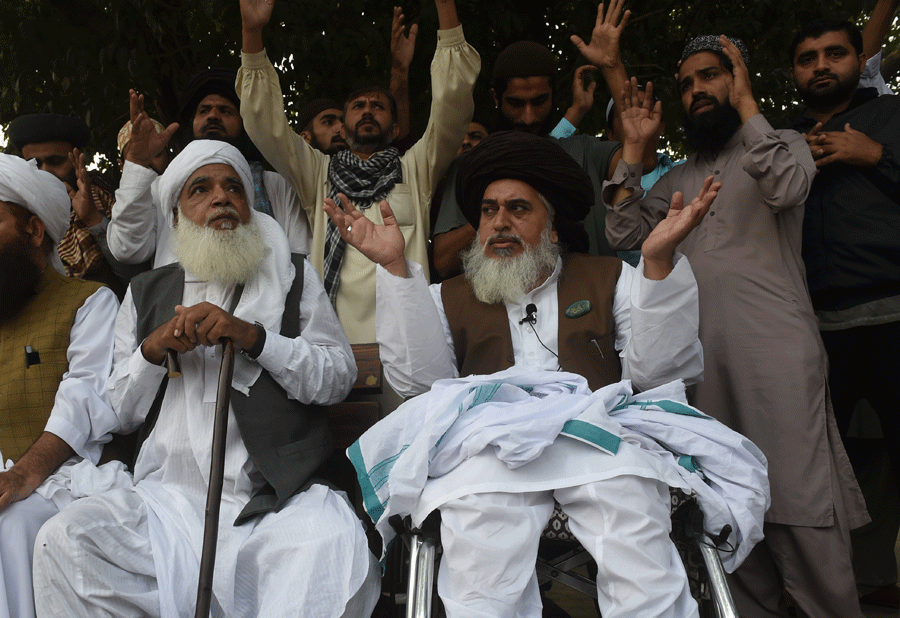Justice on Trial
By K. K. Shahid | Cover Story | Published 7 years ago
For a fleeting moment in time, Pakistan seemed to have finally found a statesman to lead it. But that light in the dark, flickered and burnt out even before it had caught flame. Prime Minister Imran Khan saw, he stated, and then, silence. As the extremists took charge, and the country quaked in fear of rampaging mobs, the government and the army in tandem with it, confined themselves to their quarters, and when visible, seemed to be furiously backpedalling on their head of state’s avowed oaths made just days earlier. And so, capitulation: dialogue with the destroyers, a dangling noose over the exonerated, and fading hope for the future…

On October 31, the Supreme Court’s three-member bench announced its verdict in favour of Aasia Bibi, who had been sentenced to death on charges of blasphemy. Chief Justice Mian Saqib Nisar, Justice Asif Saeed Khosa and Justice Mazhar Alam Khan Miankhel, heard Aasia’s final appeal and decided that there was no evidence against her, upholding the appeal against the Lahore High Court’s (LHC) October 2014 verdict.
Aasia, a Christian woman, was convicted under Section 295-C of the Pakistan Penal Code for “defamatory statements against Prophet Muhammad (Peace Be Upon Him) during an argument with three Muslim women.” She was sentenced to death by a trial court in November 2010, with the verdict being appealed in the LHC.
Her counsel, Saiful Mulook, argued that there was an ulterior motive in the allegations, citing that the incident, which took place on June 14, 2009, was reported five days later, on June 19. Mulook also reiterated that the prayer leader who had filed the case was not present during the incident in question.
“What we can conclude from your statements is that the prayer leader himself did not witness the incident as it happened,” said Justice Khosa, in a hearing on October 8, following which the verdict had been reserved. “No blasphemous language was uttered in the presence of the prayer leader.”
While announcing the final verdict on October 31, CJP Saqib Nisar explained why Aasia Bibi had been acquitted. “It is a well settled principle of law that one who makes an assertion has to prove it. Thus, the onus rests on the prosecution to prove the guilt of the accused beyond reasonable doubt throughout the trial,” he said. “Presumption of innocence remains throughout the case until such time [as] the prosecution [provides the evidence which] satisfies the court beyond reasonable doubt that the accused is guilty of the offence alleged against him.”

After the verdict was reserved, the Tehreek-e-Labbaik Pakistan (TLP) sensed that the proceedings were tilting in favour of Aasia Bibi’s release. It vowed to take to the streets in protest.
“[The] judges’ remarks created doubt and fears among party leaders that Aasia’s conviction may be set aside to stop her execution,” said TLP Patron-In-Chief, Afzal Qadri, at a party gathering. Unsurprisingly then, outrage spread among radical Islamist circles as soon as the verdict was announced on October 31. The TLP Chief, Khadim Rizvi, had already released a message on social media asking the “lovers of Prophet Muhammad” to come to the streets. “If the blasphemer is released then be prepared to give any kind of sacrifice until the centre overturns the decision,” he said in the video.
Soon thereafter, protesters began blocking roads and vandalising property in Karachi, Islamabad and Lahore. Activities came to a halt nationwide, as mobs instigated violence against the judges and called for mutiny within the Pakistan army, against the Chief of Army Staff, General Qamar Javed Bajwa.
Eventually, an agreement was signed between the TLP and the government, on November 3. It stated:
a) A review petition has been filed against the verdict in the Aasia Bibi case, which is the petitioners’ legal right. The government will not object to it.
b) Legal proceedings to put Aasia Bibi’s name on the Exit Control List will begin immediately.
c) Legal action will be taken for all those martyred in the protests against Aasia Bibi’s release.
d) All those arrested during the protests will be released immediately.
e) The TLP regrets any damage or hurt caused during the protests.

The government’s signatories were the Federal Minister for Religious Affairs, Noor-ul-Haq Qadri, and the Punjab Law Minister, Raja Basharat, while Afzal Qadri and Mohammed Waheed Moor represented the TLP.
With the review petition yet to be heard, the TLP leaders reiterated that if the verdict was not overturned, they would take to the streets again. They underscore the significance of the Aasia Bibi case, maintaining that it is unlike any other.
“[The] TLP wants her to be hanged because she is a proven offender,” said TLP spokesman Ijaz Ashrafi. “If she’s set free the retaliation will be many times greater than that during the Faizabad dharna. Blasphemy is unlike other cases, because it is purely a religious matter that needs to be dealt with under the light of the Quran and Sunnah, which mandates death for blasphemy. No other opinion can be taken,” he added.
The TLP leadership argues that the party’s position on blasphemy and the Aasia Bibi case should not be misconstrued as hostility towards religious minorities as a whole. “Please don’t mistake it as anything personal, or against Christians,” said Ashrafi. “The TLP plays its part in helping out Christians as well, wherever possible.”
Veteran activist and spokesman of the Human Rights Commission of Pakistan’s (HRCP), I A Rehman, meanwhile, lauded the verdict. “Justice has been finally been done in the Aasia Bibi case,” he said. There was no case against her from the get-go and the claims [against her] are nonsensical.” Rehman questioned the motivations of the TLP and other radical Islamists, for issuing violent threats until a judgment of their liking is announced. “They are initiating campaigns saying that they will slice the throats of whoever even speaks in her favour,” he said adding, “The Supreme Court decided on merit and it should not be influenced by the noise that is being made, because if this kind of influence is accepted then it will be a bad day for justice and the law in Pakistan. The government should take every step to protect the minorities.”
In an interview with Agence France-Presse (AFP) prior to the final verdict, Aasia’s family had expressed optimism that the decision would be in their favour. “We are hopeful that whatever the court proceedings are, it will be positive for us,” said Aasia’s husband Ashiq Masih. “I will be very happy the day my mother will be released,” added her daughter, Eisham Ashiq. “I will hug her and will cry meeting her and will thank God that he has got her released.” However, the family conceded that if Aasia was released, they would find it extremely hard to continue living in Pakistan and had already applied for asylum in various western countries.
Amnesty International’s Deputy Director for South Asia, Omar Waraich, criticises Pakistan’s inability to maintain the rule of law. “Aasia Bibi’s case is the saddest example of Pakistan’s failure to safeguard the marginalised and a refusal to uphold the rule of law,” he said. “Amnesty is against the blasphemy law in all forms. We don’t think anyone should be killed for saying something,” he added.
He continued that two prominent politicians – former minorities’ minister, Shahbaz Bhatti, and the former governor of Punjab, Salmaan Taseer – had already been killed over their defence of Aasia Bibi. Waraich says the government should have taken decisive action against the TLP mobs, unlike last year when it succumbed to pressure – and actually paid them to disperse. “It is sad that the [then] law minister Zahid Hamid stepped down under mob pressure, even though he did not do anything wrong,” he said. He added that there would have been an international backlash had the final SC verdict not been in Aasia Bibi’s favour.
“Pakistan’s case in the IMF won’t be impacted; no action has been taken against China’s human rights abuses, for instance,” Waraich said. “However, the European Union and the UK would [have reacted].”
Meanwhile, the TLP sees the verdict in Aasia Bibi’s favour as a result of international pressure. “We can see there is international pressure from the enemies of Islam and Pakistan. This is a great opportunity for courts to reaffirm the death penalty for blasphemy and uphold the rule of law,” said Ijaz Ashrafi. He added, “What this will also ensure is that people will not take the law in their own hands. They will trust the courts and not resort to mob violence. But if the court sets her free [following the review petition] people will have to take matters in their own hands, like Ghazi Mumtaz Qadri did, because of a lack of trust in the courts.”
Waraich, meanwhile, rubbishes the assertion that Pakistan carrying out the first-ever death penalty for blasphemy would result in a decrease in mob violence. “The claim is absolute nonsense,” he contended. “There has actually been an increase in blasphemy FIRs since 295-C was added to the Penal Code.”
No more posts to load


